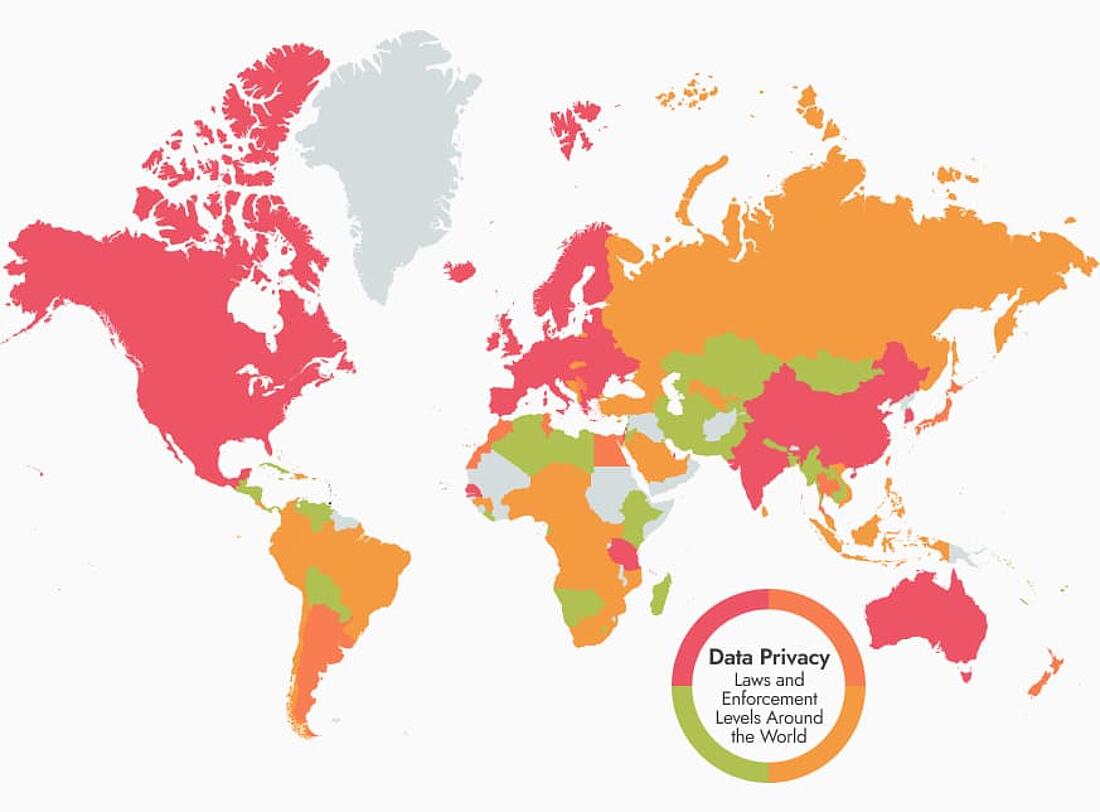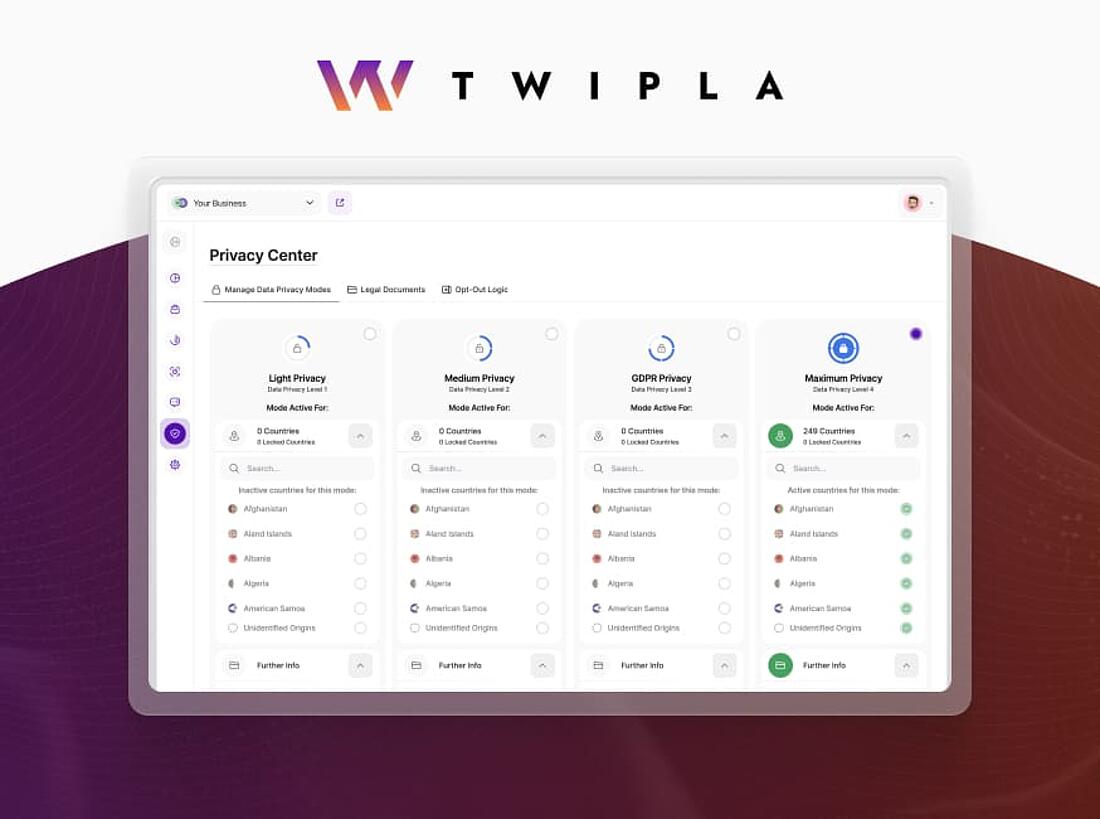- Why Us?
- Features
White Label
For SaaS Platforms & Agencies
Provide our complete analytics suite to your clients, directly within your own interface and with your/their own branding. Discover Analytics-as-a-Service and White Label Analytics. Great benefit, minimal effort.
- Pricing
- White Label
- Success Stories
- ResourcesGetting Started
CONTENTS
- Why Compliance in Marketing Isn’t Optional
- Compliance Regulations Every Marketer Should Know
- Navigating Marketing Compliance Across Channels
- Digital Marketing Compliance
- Email Marketing Compliance
- Affiliate Marketing Compliance
- Ad Compliance
- Social Media Marketing Compliance
- Content Marketing Compliance
- Website Analytics Compliance
- SEC Marketing Rule Compliance
- Marketing Compliance Checklist
- How TWIPLA Can Help with Marketing Compliance
2025 Marketing Compliance: Your Ultimate Guide (including Checklist)

Marketing compliance might not seem thrilling at first glance, but it’s an essential part of growing your business responsibly.
Neglecting it can lead to significant legal, financial, and reputational risks, making it critical for businesses to prioritize compliance from the outset.
In this blog, we’ll cover why compliance in marketing matters, provide a checklist to simplify your efforts, explore key regulations every marketer should know, and discuss how compliance varies across channels like email and digital marketing.
We’ll also highlight how tools like TWIPLA can help you stay compliant while optimizing your strategies.
Why Compliance in Marketing Isn’t Optional
(Even If Your Business Is Small)
Compliance is often seen as a concern only for large corporations by many small businesses.
This misconception can lead to serious consequences.
Regulations apply to businesses of all sizes, and authorities don’t differentiate between a startup and a multinational when enforcing penalties.
Take data privacy laws like GDPR and CCPA, for example.
Imagine you’re running an online store and decide to use customer data to send targeted ads. Without obtaining explicit consent under these regulations, you could face hefty fines or even legal action.
These regulations require businesses to handle customer data with care, no matter the scale of their operations.
Ignoring them could result in fines that may cripple a smaller businesses and new businesses, making it essential for startups to consider GDPR early in their lifecycle.
Furthermore, compliance builds trust.
When your audience knows you’re following the rules, they’re more likely to engage with your brand and share their information confidently.
Marketing compliance isn’t just about avoiding trouble; it’s about creating a sustainable and ethical business.
By adhering to compliance standards, businesses can also open doors to broader opportunities, like increasing their ESG rating and the possibility of partnerships with larger companies that prioritize ethical operations.
Another reason to focus on compliance is risk mitigation. Marketing campaigns often involve complex strategies, from social media promotions to email outreach.
54% of organizations have experienced a cyberattack in the last year (Ponemon Institute), highlighting the importance of robust compliance measures to mitigate risks.
Any misstep in these channels could lead to not only financial penalties but also reputational damage. For example, an email campaign that violates anti-spam regulations could alienate your audience and tarnish your credibility.
This is why compliance and compliance audits should be woven into the fabric of your marketing strategy, rather than treated as an afterthought.
Compliance Regulations Every Marketer Should Know

Understanding the key marketing compliance regulations is critical. Here are the most prominent ones:
General Data Protection Regulation (GDPR): Applies to businesses targeting or processing data from EU residents. It mandates clear consent for data collection and transparency in handling user information. Businesses must also honor user requests to delete or modify their data. Following GDPR compliance marketing practices can help ensure you avoid hefty fines.
California Consumer Privacy Act (CCPA): Gives California residents rights over their data, including the ability to opt out of data sales. Companies are also required to provide clear disclosures about data usage.
ePrivacy Directive: Complements GDPR by focusing on electronic communications. It governs the use of cookies, email marketing, and confidentiality in digital interactions. Compliance ensures that user permissions are respected, particularly when tracking online behaviors.
CAN-SPAM Act: Regulates email marketing in the U.S., requiring accurate sender information and an easy way to unsubscribe. Non-compliance can result in fines of up to $43,792 per email violation. Adhering to email marketing compliance standards can help you avoid these penalties.
FTC Guidelines: Ensure that advertising is not deceptive or unfair, covering everything from affiliate disclosures to influencer marketing. These guidelines emphasize transparency to maintain consumer trust.
ADA and WCAG: These standards promote digital accessibility, ensuring your content is usable by everyone, regardless of abilities. Non-compliance could result in lawsuits and alienation of key audience segments.
Brazil’s LGPD (Lei Geral de Proteção de Dados): Similar to GDPR, this law governs the collection and processing of personal data in Brazil. It emphasizes data transparency and the rights of individuals to access, correct, or delete their information.
India’s PDP Bill (Personal Data Protection Bill): Aims to safeguard personal data by requiring companies to obtain user consent before processing their data. It also enforces stringent measures for data localization and security.
Singapore’s PDPA (Personal Data Protection Act): Regulates the collection, use, and disclosure of personal data in Singapore. Businesses must ensure consent and protect user data to avoid penalties.
Digital Marketing Compliance
In digital marketing, compliance primarily revolves around data privacy and ad transparency.
Platforms like Google Ads have strict rules for ad content, targeting, and landing pages.
Ensuring your website is compliant with GDPR or CCPA is equally critical since this is where most digital marketing leads. Avoid using third-party cookies without explicit consent and write a clear privacy policy.
Cookieless tracking solutions can help maintain digital marketing compliance while delivering actionable insights.
Additionally, digital marketers must ensure that all online promotions comply with local advertising laws. This includes accurate pricing information, clear terms and conditions, and disclosures for discounts or limited-time offers.
By embedding compliance into your digital strategy, you not only protect your brand but also enhance customer trust.
Email Marketing Compliance
Email marketing requires meticulous attention to regulations like GDPR and CAN-SPAM.
Always obtain explicit consent before adding someone to your email list. Include your business’s contact details in every email and provide an easy opt-out option.
Crucially, GDPR places restrictions on cold emailing - allowing it only when strict conditions around consent and transparency are met.
But with any type of emailing, double opt-in systems are a great way to ensure compliance and build trust with your audience.
Additionally, monitor your email bounce rates and remove inactive subscribers to maintain a healthy email list.
Consider using email marketing platforms with built-in compliance features.
These tools can automate tasks like consent tracking and provide templates that align with regulatory standards.
Staying proactive in this channel can save your business from costly penalties while maintaining privacy and compliance in marketing campaigns.
Affiliate Marketing Compliance
Affiliate marketing thrives on transparency. The FTC requires clear disclosure of affiliate relationships, typically through statements like “This post contains affiliate links.”
Ensure your affiliates also comply with these guidelines, as their actions can reflect on your brand. Create a compliance guide for your affiliates and regularly review their promotional activities.
Tracking affiliate campaigns with dedicated software can also help maintain compliance.
These tools provide insights into affiliate performance and flag potential violations, ensuring that your program operates within legal boundaries.
Adhering to marketing data compliance guidelines ensures the integrity of your affiliate program.
Ad Compliance
Creating compliant ad content is about ensuring both accuracy and transparency.
Misleading claims, even unintentionally, can lead to regulatory fines or damage to your brand’s credibility.
Make sure your advertisements present clear, honest information, avoiding exaggeration or unverifiable claims.
And when using retargeting and remarketing, ensure your campaigns comply with privacy laws by obtaining proper consent for tracking and ad personalization.
Intellectual property compliance is another key area; using copyrighted material without proper permissions can result in legal repercussions.
Collaborate with legal experts to review your ad copy, especially for campaigns in highly regulated industries like healthcare or finance.
Additionally, maintain documentation for all promotional materials to demonstrate compliance if audited.
By prioritizing ethical advertising, businesses not only adhere to regulations but also foster trust with their audience.
Social Media Marketing Compliance
Social media and GDPR - among other laws - are closely related.
Social platforms like Facebook, Instagram, and TikTok also have strict advertising policies that require transparency and accuracy.
Ensure sponsored posts and advertisements comply with platform guidelines and disclose partnerships appropriately.
Misleading claims or failure to follow these rules can lead to account suspensions.
Additionally, be mindful of user data privacy when running targeted ad campaigns on these platforms, ensuring compliance with global data protection laws.
Content Marketing Compliance
Privacy compliance is one of many important content marketing tips.
When creating blogs, videos, or other content, verify that all intellectual property, from images to quotes, is used legally.
Attribution should be clear, and any medical, financial, or other advice must include disclaimers to avoid legal liability.
Consistently review content for potential compliance risks, such as outdated claims or unauthorized use of copyrighted material.
By prioritizing accuracy and transparency, content marketing becomes both effective and compliant.
Website Analytics Compliance
Analytics plays a vital role in modern marketing, but it comes with its own compliance challenges.
Businesses must ensure that analytics platforms align with data privacy regulations such as GDPR, CCPA, and ePrivacy. For example, tools like TWIPLA offer cookieless tracking, which eliminates the need for intrusive consent banners while maintaining full visibility of visitor data.
Organizations should also anonymize collected data, securely store it in compliance with local laws, and regularly audit analytics setups to avoid non-compliance risks. By ensuring analytics compliance, businesses can confidently extract insights while safeguarding customer trust.
SEC Marketing Rule Compliance
→ What You Need to Know
For businesses in financial services, compliance with the Securities and Exchange Commission (SEC)’s Marketing Rule is non-negotiable.
This rule governs how investment advisors advertise their services, requiring all claims to be substantiated and free from misleading statements.
Testimonials and endorsements must include clear disclosures about compensation or material conflicts of interest.
Compliance in this area not only protects your business but also ensures you’re building genuine trust with clients.
Advisors must also maintain records of all advertisements and related documentation to demonstrate compliance during audits.
Investing in robust compliance software can simplify this process and reduce the risk of errors.
By prioritizing SEC marketing rule compliance, you protect both your business and your clients’ interests. Stay aware of updates, including the SEC marketing rule compliance date, to ensure your strategies remain up-to-date.
Marketing Compliance Checklist

Marketing compliance can be complex, but having a checklist simplifies the process by breaking it into manageable steps.
To give you a structured overview, here's a practical table outlining essential compliance considerations across different areas of marketing.
This quick guide ensures you can address the most critical aspects efficiently, serving as a starting point for more in-depth strategies.
Area | Action Point | |
|---|---|---|
Data Privacy | ⬜ Align practices with GDPR, CCPA, ePrivacy regulations. | |
⬜ Audit data handling practices to address vulnerabilities. | ||
⬜ Ensure cross-border data transfers meet SCC requirements. | ||
⬜ Build a response plan to act swiftly after security incidents. | ||
Email Marketing | ⬜ Ensure compliance with CAN-SPAM and GDPR regulations. | |
⬜ Provide clear unsubscribe options in all campaigns. | ||
⬜ Segment email lists based on consent for relevant content. | ||
⬜ Avoid deceptive subject lines to maintain transparency. | ||
⬜ Ensure email content align with user expectations. | ||
Ad Content | ⬜ Verify ads for accuracy and IP compliance. | |
⬜ Collaborate with legal experts for ad copy reviews. | ||
⬜ Adhere to local laws, particularly for highly regulated sectors. | ||
Affiliate Marketing | ⬜ Disclose affiliate relationships to comply with FTC guidelines. | |
⬜ Train affiliates on compliance and review their promotions. | ||
⬜ Monitor compliance with platform policies and regulations.. | ||
Social Media | ⬜ Respect platform rules for sponsored content & transparency. | |
⬜ Review platform policy updates to prevent violations. | ||
⬜ Ensure influencer agreements include compliance disclosures. | ||
⬜ Verify the accuracy of any reposted user-generated content. | ||
Accessibility | ⬜ Ensure marketing complies with WCAG inclusivity rules. | |
⬜ Use tools to evaluate and enhance content accessibility. | ||
⬜ Test materials with assistive technologies to ensure usability. | ||
Content Marketing | ⬜ Verify intellectual property usage for all content. | |
⬜ Include proper disclaimers for medical or financial advice. | ||
⬜ Review content for outdated claims or unauthorized material. | ||
⬜ Avoid clickbait & ensure claims are accurate to maintain trust. | ||
Analytics | ⬜ Align analytics platforms with GDPR, CCPA & ePrivacy rules. | |
⬜ Go cookieless for full data capture w/o consent banners. | ||
⬜ Audit analytics setups regularly to address compliance risks. | ||
⬜ Ensure analytics dashboards provide exportable audit trails. | ||
SEC Marketing Rule | ⬜ Substantiate all claims in financial service advertisements. | |
⬜ Maintain records of all advertising content for audits. | ||
⬜ Disclose compensation for testimonials/endorsements clearly. |
How TWIPLA Can Help with Marketing Compliance

Navigating marketing compliance becomes much easier with the right tools.
TWIPLA’s privacy-compliant website intelligence platform is designed to support businesses in adhering to key regulations like GDPR, CCPA, and ePrivacy.
TWIPLA’s cookieless tracking ensures you can gather insights without relying on consent banners or cookies, maintaining full visibility of your traffic.
Its advanced data anonymization and secure EU-based storage guarantee compliance with global privacy laws.
By integrating TWIPLA into your workflows, you’re not just staying compliant; you’re setting a new standard for ethical and effective marketing.
Moreover, TWIPLA offers educational resources to help teams understand the nuances of marketing compliance. From webinars to detailed guides and a community portal, these resources empower marketers to implement best practices confidently.
With TWIPLA, compliance doesn’t have to be a hurdle - it becomes a foundation for sustainable growth.
Share article
Get Started for Free
Gain World-Class Insights & Offer Innovative Privacy & Security

You might also like
What Is Digital Experience Analytics? A Complete A-Z Guide 23 October 2024 - by Simon Coulthard
23 October 2024 - by Simon Coulthard
How These 16 Marketing Case Studies Changed the Game 21 October 2024 - by Simon Coulthard
21 October 2024 - by Simon Coulthard
Demographic Segmentation for Marketers: The Only Guide You Need 10 October 2024 - by Simon Coulthard
10 October 2024 - by Simon Coulthard











